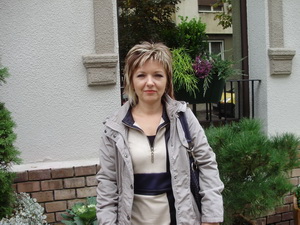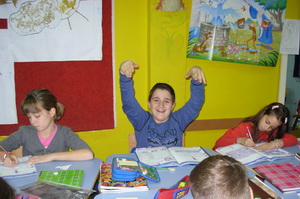 Teacher Snežana Kidžin from Pančevo has taught a large number of students to read and has prepared them for life, including six little ones who needed additional educational support, whether due to their development impairments or origin from families experiencing difficult circumstances, or due to them being extraordinarily gifted children.
Teacher Snežana Kidžin from Pančevo has taught a large number of students to read and has prepared them for life, including six little ones who needed additional educational support, whether due to their development impairments or origin from families experiencing difficult circumstances, or due to them being extraordinarily gifted children.
What does inclusive education, introduced into the Serbian educational system in 2009, look like in practice; have the obstacles posed by the attitudes of teachers and parents been overcome; are the colleagues and parents sufficiently informed on the rights and obligations – there seems to be no better interlocutor for these subjects than Snežana, a modest, but highly professional teacher. One additional reason for the interview with Snežana is the fact that the presentation of her mathematics class for third grade, adapted for working with a student with impairments located on the autism spectrum, was awarded the special prize of the Network for Inclusive Education in 2014. She is also an educator in seminars, as a member of this Network, active in the school collective, in the professional team for inclusive education, support for the team for the protection of children from abuse and neglect in the field of the inclusion of children requiring development support, in the School Board. She is a wife and a mom, and was glad to talk to the Social Inclusion and Poverty Reduction Unit of the Government of the Republic of Serbia to share her wealth of experience.
How did you react in 2009, when inclusive education was systematically introduced?
I was glad, because even before that I applied various methods of working with children who could not follow the regular programme for various reasons. In a way, I embraced this systemic change. Through my classes I always used methods and techniques of individualized work programmes. The introduction of inclusive education just brought along additional satisfaction. You know, in every generation you have students with dyslexia, dysgraphia, various intellectual capacities, children from socially vulnerable families. Not all children are equal. Every one of us is different, and not everyone can learn the same way, with the same success. Even before 2009 I worked by following the personal capacities of students. Inclusive education just made the framework better defined. (…)
Do you remember the first student you worked with using an individual plan of education?
Of course. It was a girl from the home for children without parental care. She was enrolled in school at nine years old, without having acquired social, hygienic habits, and many life skills. She could not express emotion: love, fear… We stayed an extra hour every day after class for her to do her homework. I made her personal primer. We worked slowly, but thoroughly. By fourth grade she did not manage to learn written letters, but she could calculate, write block letters… She acquired numerous life skills – how to behave in the street, in a shop; she went with the class to the theatre, the cinema. (…)
Persons with autism are known to have difficulties making physical contact. One former student was in seventh grade when he just approached and hugged me. Namely, I was on sick leave, and upon my return we met in the yard. He asked me: “You are the teacher Snežana? Where were you?” I replied that I was sick, and now I came back to work. He approached and hugged me. That feeling is my greatest reward, because this confirmed that I was part of his life. (…)
Where does your professional dedication come from?
Work with children who require support should not be initiated with pity, because you will fail to see their potential. Occasional failures by the child do not mean the professional and personal failure of the teacher. The top professionals stand out through the myriad of ideas they have, the attitude that they can do anything, they have no fear, and are persistent in seeking solutions for any seemingly hopeless situation. That, I guess, is why they are called “top”. That is what I aspire to in my work.
 Government of the Republic of Serbia
Government of the Republic of Serbia
















 pdf [271 KB]
pdf [271 KB]
Leave a Comment